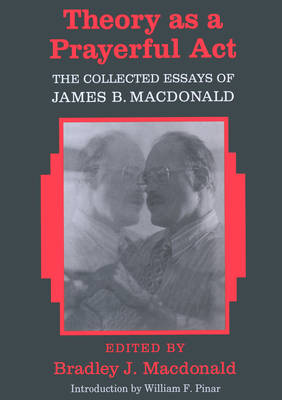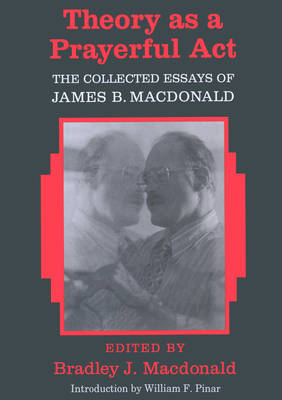
Door een staking bij bpost kan je online bestelling op dit moment iets langer onderweg zijn dan voorzien. Dringend iets nodig? Onze winkels ontvangen jou met open armen!
- Afhalen na 1 uur in een winkel met voorraad
- Gratis thuislevering in België vanaf € 30
- Ruim aanbod met 7 miljoen producten
Door een staking bij bpost kan je online bestelling op dit moment iets langer onderweg zijn dan voorzien. Dringend iets nodig? Onze winkels ontvangen jou met open armen!
- Afhalen na 1 uur in een winkel met voorraad
- Gratis thuislevering in België vanaf € 30
- Ruim aanbod met 7 miljoen producten
Zoeken
Theory as a Prayerful Act; The Collected Essays of James B. Macdonald - Edited by Bradley J. Macdonald
The Collected Essays of James B. MacDonald - Edited by Bradley J. MacDonald
Bradley J MacDonald
€ 39,45
+ 78 punten
Omschrijving
This book collects the most important essays of the late James B. Macdonald, educational theorist and cultural critic. Given the rise of importance of educational thinkers within the current move toward interdisciplinary theory dialogue. Macdonald's work stands as an important link between earlier technical discussions associated with curriculum development and contemporary moves toward viewing the central role of educational institutions and discourses in social and cultural life. Macdonald's essays - spanning from the early '60s to the early '80s - argue for the necessity of curriculum theorizing in the attempt to create a more humane schooling environment, a process that he consistently linked to larger cultural and social transformations.
Specificaties
Betrokkenen
- Auteur(s):
- Uitgeverij:
Inhoud
- Aantal bladzijden:
- 216
- Taal:
- Engels
- Reeks:
- Reeksnummer:
- nr. 22
Eigenschappen
- Productcode (EAN):
- 9780820427928
- Verschijningsdatum:
- 1/12/1995
- Uitvoering:
- Paperback
- Formaat:
- Trade paperback (VS)
- Afmetingen:
- 178 mm x 254 mm
- Gewicht:
- 381 g

Alleen bij Standaard Boekhandel
+ 78 punten op je klantenkaart van Standaard Boekhandel
Beoordelingen
We publiceren alleen reviews die voldoen aan de voorwaarden voor reviews. Bekijk onze voorwaarden voor reviews.











